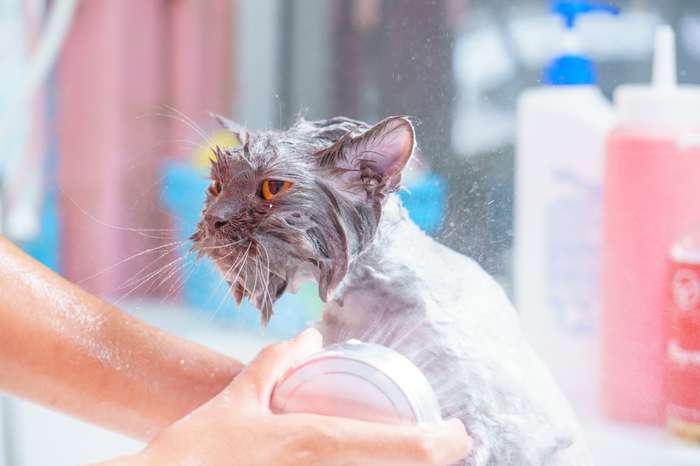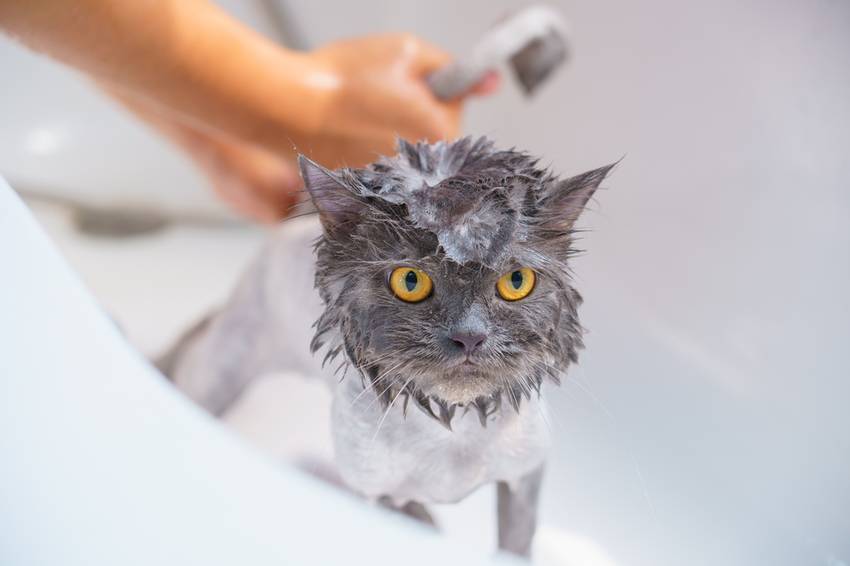It is a universal accepted truth that cats hate water. The internet littered with videos of cats falling into bathtubs or aquariums. It causing everyone to levitate in utter horror.
Cats will splash in water bowls or lick drips from the bathroom faucet. But when it comes to larger bodies of water. They lose their sense of humor entire.

Reasons why your cat hates water:
Most domestic cats are descendants of African wild cats. From dry climates with very few large bodies of water. Such as rivers and lakes. As a result, these cats never had to learn to swim. Even now, near 10,000 years later, domestic cats still avoid water.
Survival instinct:
Cats tend to avoid water because they cannot control it. A drop from the tap and a shallow puddle is one thing; a raging river is another.
Also, that luxurious fluffy coat that you love for a pet? It absorbs water like a thirsty sponge, weighs down the kitten, and affects their agility. Wet fur takes a long time to dry and can get cold quick.
Additionally, water in a cat’s eyes and ears can affect their ability to assess nearby threats. Making them more vulnerable to potential enemies.
Cats are perfectionists:
We assume cats obsessed with grooming pure out of vanity. But it’s also about staying in top shape to deal with danger.
While water has no particular odor to humans, the same is not true for cats. Cats can smell the chemicals in the water and prefer not to get it wet, so they don’t smell like that all day.
Cats also secrete pheromones into their fur. To mark their territory and communicate with others. So that any water immersion will remove this.
Past trauma:
Many cats fear water because of a past event. Most common from caught in a downpour, splashed with water. Or forceful bathed or submerged. The shock of sudden wetness can linger and cause cats to avoid water at all costs.
Exceptions:
As with all things, some exceptions prove the rule. Some cats like water.
Besides larger cats such as lions and tigers. Who love a bath to cool off, many common domestic breeds love a good splash in the water.
Some cats enjoy sticking their paws in a bowl of water or hitting a dripping faucet. It can be a fun sensory experience. (think sparkling surfaces and sounds of trickling and gentle splashing). As long as they still feel in control.
And then there are exceptions to the “cats hate water” rule. Abyssinians and Bengals are fearless and adventurous. And will happy venture into the water. While Maine Coons have coats that repel it. The Turkish Van is a rare cat with waterproof fur and is also known as the “swimming cat.”
Can I make my cat like water?
It is possible to get your cat used to the water, but it will be a process and will must a lot of patience on your part.

Remember that cats are very easy overstimulated. Bathing for them can be more of a horror story than you realize. From how their fur feels. When it’s wet to the smell of any soaps and shampoos. And the sound of gushing running water echoing through the tiled bathroom.
Bathing cats that are afraid of water:
We’ve already mentioned that cats are quite fussy – they spend most of the day grooming. So they’re self-cleaners.
But if you have to bathe your cat. Here are some helpful tips to make the whole. Experience less traumatic for your cat and leave you a lot less scratched.
Get organized:
Prepare things ahead of time so that everything you need is within easy reach – shampoo. (choose one made for cats). Treats, toys, a mug or pitcher to pour in, and a fluffy warm towel to wrap them in afterward.
Placing a towel or rubber mat at the bottom of the tub is a good idea to give your cat more grip and safety. A slippery bath floor will make your cat feel more vulnerable and stressed.
Keep things calm and peaceful:
The goal is to make sure you cause as little stress as possible. Fill the tub beforehand, as the sound of running water can be alarming to your cat. Also, keep the water level in the tub low, so your cat doesn’t feel too threatened.
Avoid loud noises. Keep the door closed to deal with outside noise, and give your cat lots of soothing and calm praise.
Be firm but gentle:
Your cat will feel very vulnerable during the bath. Hold them firm but don’t be too rough as this will stress them out. Bathing your cat should never resemble an amateur wrestling match.
Pay attention to your cat’s body language. If these look overwhelmed and stressed, don’t force it. Give it lots of praise and treats to create a positive environment.
Use a cup, not a faucet:
When it’s time to rinse, a cup or pitcher will be much less scary for your cat than a noisy faucet or hand shower. It is always better to clean a small area than to submerge the cat’s entire body.
Go slow and make sure you get all the foam to avoid skin irritation. Your cat is also likely to groom itself immediately after a bath. And you don’t want her to ingest any lingering shampoo.
It is important to avoid wetting your cat’s head. Their ears and eyes are extreme sensitive, as are their whiskers. Getting water on your face almost guarantees an angry kitty.
Dry with a towel in a warm room:
No prizes for guessing that coming to your already shaken kitty with a roaring hair dryer will end bad.
A warm, soft, and fluffy towel will do fine. Gentle wipe the cat and let it do the rest. Keep your cat in a warm room away from drafts, and don’t let him out until he is completely dry, so he doesn’t catch a cold.
Give the treats and then leave:
Shower your cat with lots of praise and treats, then withdraw to put her out of her misery. They are overstimulate and need their space at this point.
When your cat seems to have recovered from the experience. Why not spend some time playing to give her. A healthy outlet from overstimulation and re-establish a positive atmosphere?
For those who have survived bathing their cats, we have an article on cat skin, coat, and dental care.
Maine Coon Cats: Gentle Giants of the Feline World:

The Giants of the Cat World:
Maine Coons are the largest of all domesticated cat breeds. They gain as much as 2 pounds (0.9 kilograms) per month during their growing cycle. Which ends at about four years of age — more than quadruple the maturity time of other breeds. While most adult cats weigh about 7 pounds (3.12 kilograms). Maine Coon male cats tip the scales at up to 25 pounds (11.3 kilograms). Females typical weigh in at about 20 pounds (9 kilograms).
“Their nickname of ‘gentle giant’ is well-deserved.” Sandra Cagain, owner of the Orlando Cat Café, says in an email interview. “My two cats are each 20 pounds (9 kilograms), and they are the most gentle, sweet and loving cats I have ever had. They are very well mannered and never use their claws inappropriate. And will always let you pick them up and hold them — even if they would prefer not to held.”
Weight alone sets the Maine Coon apart, but this giant cat doesn’t stop there. Maine Coons are some of the world’s longest domesticated cats. Both male and female Maine Coons typical reach up to 40 inches. (102 centimeters) in length from their noses to the tips of their bushy tails.
They like water:
Most cats have an aversion to getting wet. But Maine Coon cats will look for opportunities to wet their whiskers. Equipped with waterproof fur, these cats don’t mind bathing and will even go for a swim. Tissy, a 5-year-old Maine coon from Pennsylvania, made headlines. When she regular enjoyed splashing around in the family pool during the summer.
“Maine Coons love water. Which is a little-known fact to most people,” says Becky Beach, owner of MomBeach.com, in an email interview. “My cat always wants to get in the tub or shower with me. She loves getting wet! It’s so fun to watch.”
Conclusion:
Friendly. Intelligent. Huge. Maine coons are a rugged, long-haired cat breed. That has become a favorite among cat fans worldwide. From the breed’s mysterious origins to its strange dog-like demeanor. Maine Coon cats are not your average every day housecat.

